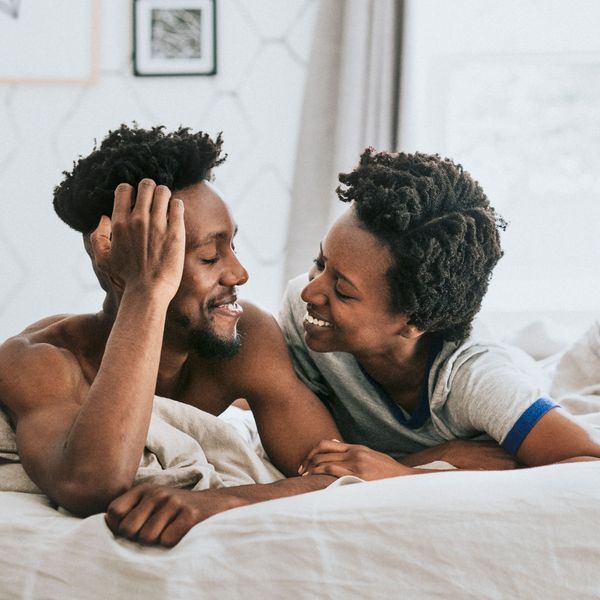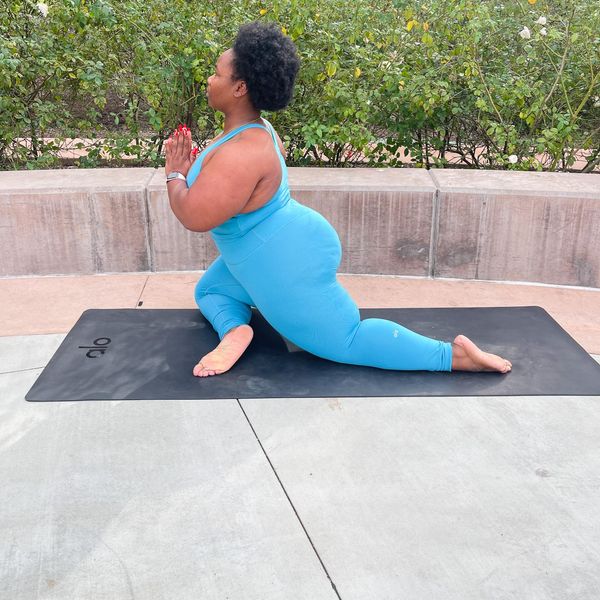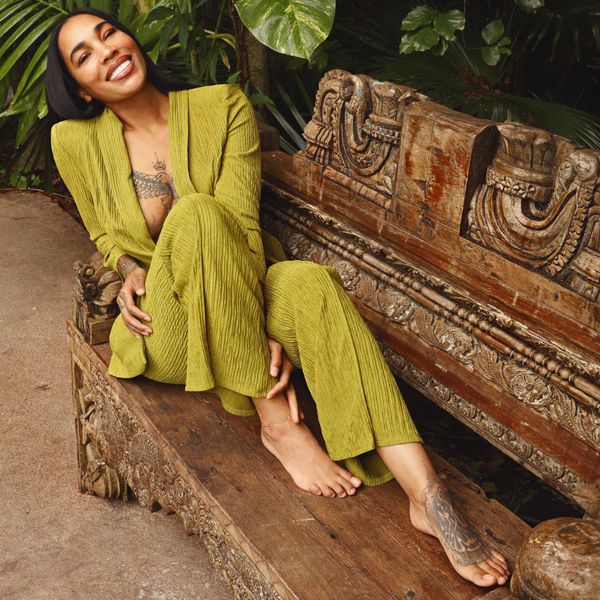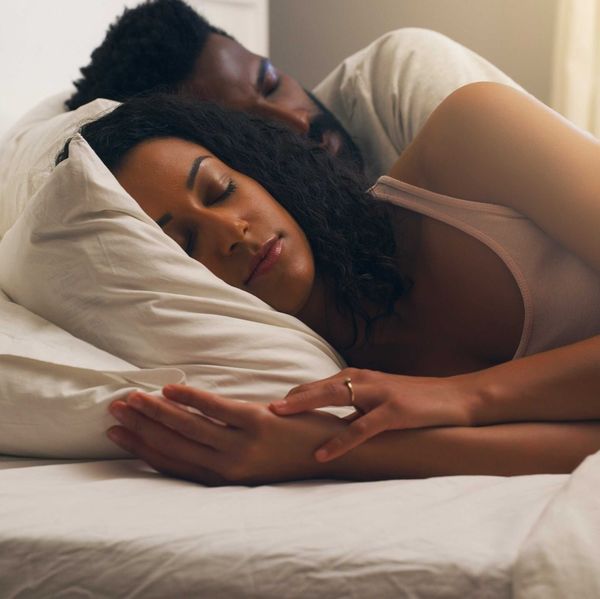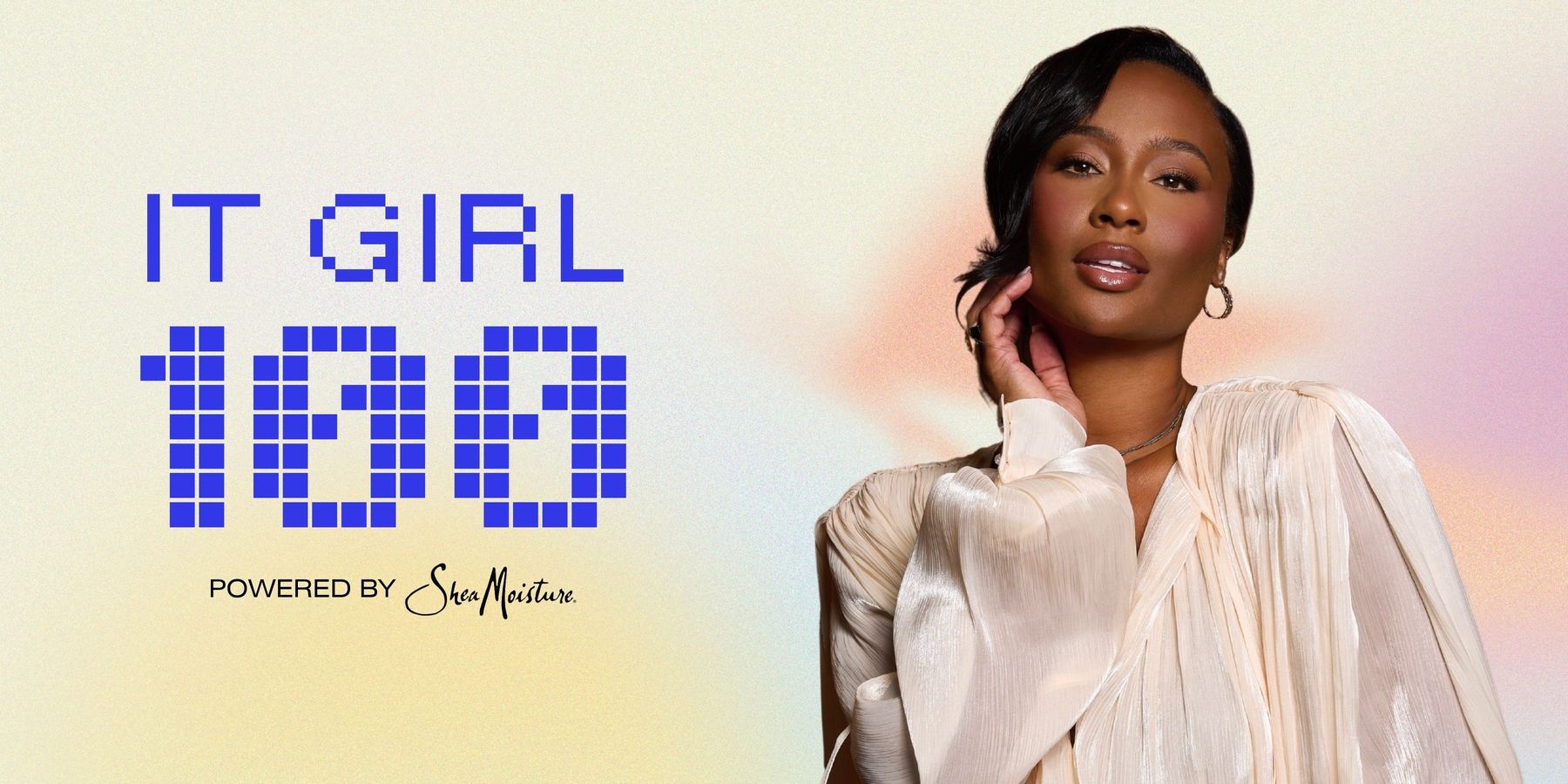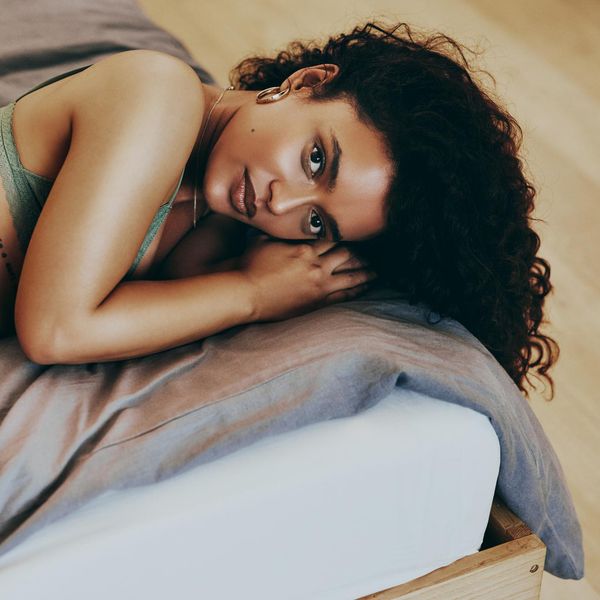
Sen·su·al·i·ty: the enjoyment, expression, or pursuit of physical, especially sexual, pleasure.
Can y’all smell the roses from the sensual season we’re living in? The fact that the “soft life” is a whole movement is a new awakening to a generation that has access to healing and sensuality like no other! I’m in awe and appreciation that individuals across the globe are allowing themselves to step into what has often been perceived as feminine energy and making it their own self-soothing daily practice.
As I was researching this subject matter, I noticed the word “sensuality” is often misunderstood as being something amplified sexually via romantic bonds and not as much individually, which does more of a disservice to us than helps us. The more attuned you are to yourself in solitude, the better you are to have that sensual pleasure amplified with another person in any capacity.
Sensuality is something we should challenge ourselves to do every day, being mindful of the sounds around us, examining our thought processes and feelings, and discovering sensuality in a physical manner alone in different ways.
Here are expert tips on how to be more sensual in your every day life:
1. Practice mindfulness by really tuning into your five major senses.
According to licensed mental health counselor and co-director of Modern Sex Therapy Institutes, Richard M. Siegel, Ph.D., "'sensual' simply means ‘of the senses’-- sight, smell, sound, taste, and touch.” And because we live in such a fast-paced world, constantly multitasking, barely focusing on one thing at a time, it’s very easy to lose a sense of all the things we’re seeing, smelling, touching, tasting, and hearing because we’re always on the go. Exploring our sensuality daily means constantly challenging yourself to be curious about anything and everything you come across.
Mental health/drug and alcohol therapist Joella Smith states, “I always suggest my clients take at least five minutes when you wake up to use your senses (listening to the birds outside, stretching/rubbing body aches, watching the sunrise, etc.). The goal, just like mindfulness, is to find pleasure in being in the moment by using all your senses. Being kind to oneself, loving our bodies, and practicing self-love daily will make us all more sensual people.”
Being in tune with our sensual selves has everything to do with challenging ourselves to be present and fully engaged with everything we do consistently. As they say, "Self-love is the best love." Meditation teacher Kirat Randhawa echoed a similar sentiment, “An element of developing sensuality with self is to practice receiving yourself just as you are - in all of your emotional states - with loving awareness. This receptivity is integral to restoring a sense of wholeness and releasing the fear of what we might encounter if we turn inward. Pleasure is a beautiful way to soften into our hearts and bodies while feeling resourced and supported to navigate anything that may arise.”
2. Engage in sensuality through meditation.
There is nothing like a little one-on-one time with yourself, where you can go to a safe place and release it all through stillness. “Meditation is a practice of becoming deeply familiar with yourself and your moment-to-moment experience with tenderness,” states Randhawa. “What is more sensual than befriending the self with such openness? When we practice this awareness in meditation in relation to how we receive the breath and the different sensations and thoughts and practice softening into those experiences irrespective of our expectations, we cultivate an opening of the mind. This is key to identifying the different aspects of ourselves and rest there with more ease. It allows for a balanced indulgence.”
"Meditation is a practice of becoming deeply familiar with yourself and your moment-to-moment experience with tenderness. What is more sensual than befriending the self with such openness?"
Also, for anyone that has a rough time with mediation because they feel like they can’t pause their mind, I highly suggest using the Calm or Liberate app that provides guided meditation to help zero in on tuning out your thoughts and following the background noise (examples is like the sound of waves or rain drops) all while actively listening to the instructor's voice. If you find stillness difficult, even with guided meditation, trying out movement meditation could be more helpful.
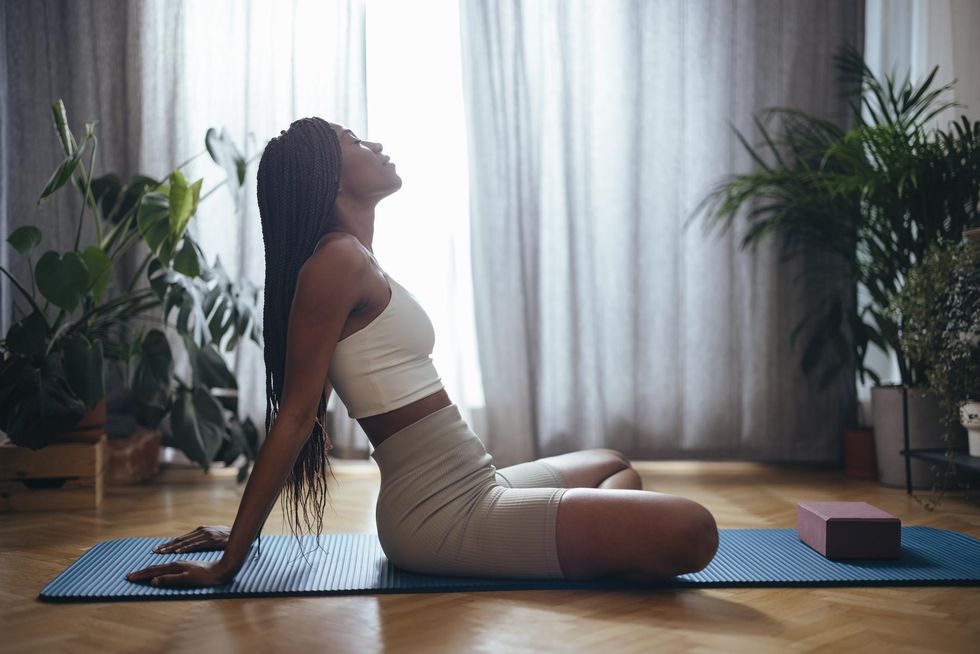
miniseries/Getty Images
3. Be more sensual through breathing techniques.
Breathwork is a skill set we should all learn because it’s an amazing self-soothing tactic that helps regulate our physical and emotional well-being. There are several different types of breathwork techniques; Randhawa recommended “the five-count box breathing technique to simply restore clarity in the mind and presence with the body -- you inhale for five, pause for five, exhale for five, and pause for five...and continue this for a few minutes. It allows one to experience a more spacious feel of the moment and awaken to the beauty that is here right now.”
4. Deepen your journey to your feelings and senses through writing.
It’s our words that paint every scenario we envision or go through, and it’s our words that help us dive into understanding our feelings more. Exploring your feelings on paper or even in your notes section on your phone can aid in profoundly exploring sensuality. Writing and creative expression coach Nkem Chukwumerije states, “In order to get to a place where we are writing from a place of freedom, and true connection to our inner worlds and outer surroundings, we must have a connection with our sensual selves. This means, for instance, when writing a scene depicting the breeze in the air, as readers, we want to know what kind of breeze that is and how it feels to feel that breeze. So, as a writer, we must relax our minds, wander outside into the breezy early afternoon, and sit in the center of a near-empty park, allowing the breeze to stroke our skin. We must feel each molecule of air as it dances with our face, arms, body and begins to articulate just how this feeling touches us.”
Reading has been my favorite hobby since I was a little girl, and I’ve always noticed the best stories are depicted through minuscule detail to make you feel like you were there. Coming home to your sensuality is paying attention to the details surrounding you in slow motion. “After we feel, we can conjure up words to articulate that feeling and translate it onto the page where readers will not only read about the breeze but feel the same breeze we felt because we took the opportunity to be present with our embodied senses and write from that magical place."
She adds, "I often use the phrase 'experiment, explore, and allow' when it comes to writing because when we desire to express ourselves, I believe it must start from a place of pure possibility, freedom, and flow, and what better way to access what is and what can be than through our senses?”
5. Indulge in your sensual self through dancing.
There are so many ways to come home to self, and dancing is a cure in its lane. When I’m in a funk, I turn on some of my favorite tracks and dance in my mirror and speak to my insecurities and make jokes about them, as Issa did in Insecure. It sounds lame, but it’s so soothing to have fun in emotional turmoil; we’re the most adaptive mammals on this planet, but change isn’t always easy to walk through, so it’s best to find a way that works for you to come home to yourself.
“Coupling somatic practices – such as yoga, qi gong, dance, EFT/tapping – with remembering the narratives about our bodies or intentional emotional feeling can be extremely powerful in healing both emotional blockages, and ailments/dis-ease in the body," states Chukwumerije. "When we practice becoming present in our bodies and aligning our emotional experience to our embodied experience, we can access more and more of our sensuality. Life is then never the same.”
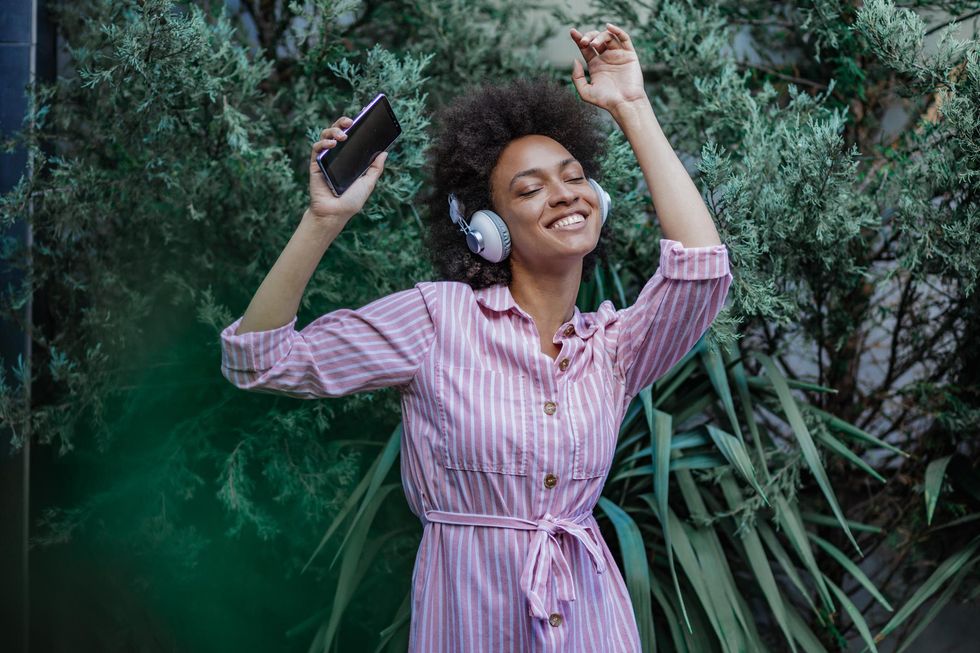
blackCAT/Getty Images
6. Explore your sensuality further through sexual self-pleasure.
I know before reading this article, most people associated the word “sensual” with "sexuality," but I hope that after indulging in all this new information, you have a better understanding of exploring your sensuality in a multifaceted way. Smith echoes a similar sentiment, “I believe too much of the discussion about sensuality revolves around sex rather than the pleasure we actually feel from what we experience from sex. Sex, however, almost always involves some level of sensuality. But one can experience and become sensual in numerous other activities that may give us that same level of pleasure. For instance, 'having an orgasm in our mouth' (when something tastes good) may do the same for our endorphins and overall sensuality as having an actual orgasm (sex).”
And though I didn’t want to put sexual sensuality at the top of this article, I did want to highlight that sexual exploration with self is one of the highest forms of fulfillment you can experience sensually. Randhawa states, “I believe that sensuality originates from within, stemming from our relationship with ourselves. And when we can be present, open, and nurturing towards the self, we can extend that to others. Sensuality is a state of pure openness and receptivity, and offering this to ourselves can help us share it with others, and experiencing it with others can help us strengthen this connection even more with ourselves in turn.”
"Sensuality originates from within, stemming from our relationship with ourselves. And when we can be present, open, and nurturing towards the self, we can extend that to others."
And I could share my own testimony reflecting on her words; for years, I used to be very irritated with sexually pleasing myself because of emotional turmoil I didn’t know how to work through at the time and shame around current fantasies I’d have. But I’ve challenged myself to talk it through in therapy and with close friends, and I never felt so liberated and excited to explore myself sexually, with toys and all. And it’s made sexual intimacy with another person heightened because I finally have so much autonomy of myself sexually.
Women are such fascinating and unique beings when it comes to sexual exploration, and I highly encourage watching the docuseries, The Principles of Pleasure, which is all about exploring female sexuality, and watching Sex, Love, and Goop which gave amazing tips on exploring sensuality through partnership.
7. Let go of your negative thoughts and discover your truth as a sensual being.
It took such a long time for me to accept that I’m a highly sensitive individual and that nothing is wrong with that. I was often gaslit as a child, which is one of the major reasons I often overthink my thoughts and feelings because I feel like they aren’t valid. It wasn’t until getting myself into therapy that I was actively ready and willing to deal with this super-soft part of myself. And taking that approach has been a game-changer because I’m better equipped to work through my emotional turmoil and support others with their issues instead of repeating the same cycle because I didn’t know myself at such depths.
Smith mentions, ”It’s all about how we feel in our bodies, so feeling at the maximum level helps. This is often tough, though, as some of us battle intrusive thoughts and avoidance patterns that prevent us from truly 'feeling.' Letting go of the negative thoughts, appreciating every day, getting out of our head, and emotionally being in tune with what’s going on will help others explore personal sensuality.”
All in all, exploring sensuality on a daily basis should be something we actively try to fit into our schedules in some form or another because no one can soothe us like we can soothe ourselves. No one can feel all that we are going through like we can, so take a deeper dive with self-exploration; your mind, body, and spirit deserve it.
Let’s make things inbox official! Sign up for the xoNecole newsletter for daily love, wellness, career, and exclusive content delivered straight to your inbox.
Featured image by Delmaine Donson/Getty Images
- I Took A Burlesque Class That Helped Me Reclaim My Sensuality ›
- How To Reconnect With Your Body - xoNecole: Women's Interest ... ›
- Erotic Love Language: How To Know It - xoNecole: Women's ... ›
RELATED
Exclusive: Viral It Girl Kayla Nicole Is Reclaiming The Mic—And The Narrative
It’s nice to have a podcast when you’re constantly trending online. One week after setting timelines ablaze on Halloween, Kayla Nicole released an episode of her Dear Media pop culture podcast, The Pre-Game, where she took listeners behind the scenes of her viral costume.
The 34-year-old had been torn between dressing up as Beyoncé or Toni Braxton, she says in the episode. She couldn’t decide which version of Bey she’d be, though. Two days before the holiday, she locked in her choice, filming a short recreation of Braxton’s “He Wasn’t Man Enough for Me” music video that has since garnered nearly 6.5M views on TikTok.
Kayla Nicole says she wore a dress that was once worn by Braxton herself for the Halloween costume. “It’s not a secret Toni is more on the petite side. I’m obsessed with all 5’2” of her,” she tells xoNecole via email. “But I’m 5’10'' and not missing any meals, honey, so to my surprise, when I got the dress and it actually fit, I knew it was destiny.”
The episode was the perfect way for the multihyphenate to take control of her own narrative. By addressing the viral moment on her own platform, she was able to stir the conversation and keep the focus on her adoration for Braxton, an artist she says she grew up listening to and who still makes her most-played playlist every year. Elsewhere, she likely would’ve received questions about whether or not the costume was a subliminal aimed at her ex-boyfriend and his pop star fiancée. “I think that people will try to project their own narratives, right?” she said, hinting at this in the episode. “But, for me personally – I think it’s very important to say this in this moment – I’m not in the business of tearing other women down. I’m in the business of celebrating them.”
Kayla Nicole is among xoNecole’s It Girl 100 Class of 2025, powered by SheaMoisture, recognized in the Viral Voices category for her work in media and the trends she sets on our timelines, all while prioritizing her own mental and physical health. As she puts it: “Yes, I’m curating conversations on my podcast The Pre-Game, and cultivating community with my wellness brand Tribe Therepē.”
Despite being the frequent topic of conversation online, Kayla Nicole says she’s learning to take advantage of her growing social media platform without becoming consumed by it. “I refuse to let the internet consume me. It’s supposed to be a resource and tool for connection, so if it becomes anything beyond that I will log out,” she says.
On The Pre-Game, which launched earlier this year, she has positioned herself as listeners “homegirl.” “There’s definitely a delicate dance between being genuine and oversharing, and I’ve had to learn that the hard way. Now I share from a place of reflection, not reaction,” she says. “If it can help someone feel seen or less alone, I’ll talk about it within reason. But I’ve certainly learned to protect parts of my life that I cherish most. I share what serves connection but doesn’t cost me peace.
"I refuse to let the internet consume me. It’s supposed to be a resource and tool for connection, so if it becomes anything beyond that I will log out."

Credit: Malcolm Roberson
Throughout each episode, she sips a cocktail and addresses trending topics (even when they involve herself). It’s a platform the Pepperdine University alumnus has been preparing to have since she graduated with a degree in broadcast journalism, with a concentration in political science.
“I just knew I was going to end up on a local news network at the head anchor table, breaking high speed chases, and tossing it to the weather girl,” she says. Instead, she ended up working as an assistant at TMZ before covering sports as a freelance reporter. (She’s said she didn’t work for ESPN, despite previous reports saying otherwise.) The Pre-Game combines her love for pop culture and sports in a way that once felt inaccessible to her in traditional media.
She’s not just a podcaster, though. When she’s not behind the mic, taking acting classes or making her New York Fashion Week debut, Kayla Nicole is also busy elevating her wellness brand Tribe Therepē, where she shares her workouts and the workout equipment that helps her look chic while staying fit. She says the brand will add apparel to its line up in early 2026.
“Tribe Therepē has evolved into exactly what I have always envisioned. A community of women who care about being fit not just for the aesthetic, but for their mental and emotional well-being too. It’s grounded. It’s feminine. It’s strong,” she says. “And honestly, it's a reflection of where I am in my life right now. I feel so damn good - mentally, emotionally, and physically. And I am grateful to be in a space where I can pour that love and light back into the community that continues to pour into me.”
Tap into the full It Girl 100 Class of 2025 and meet all the women changing game this year and beyond. See the full list here.
Featured image by Malcolm Roberson
More Than Gratitude: 7 Signs You're Struggling With Contentment In Your Life
If Thanksgiving happens to be your favorite holiday — or you just happen to be a longstanding participant of it — then there is one tradition that you are probably familiar with. Usually, before everyone eats, each individual expresses at least one thing that they are grateful for. I actually think that is one of the best things about the holiday because it reminds people to slow down and really reflect on how to be in the moment and think about the blessings that they have. And that, my friend, is what gets folks into the mindset of knowing how to be…content — even if it’s just for a brief moment.
Contentment. By definition, it’s the state of not only being “satisfied with what one is or has” but also “not wanting more or anything else.” And you know what? Although it might not be a popular aspiration of many, it is a sign of spiritual maturity on certain levels. After all, it is the Apostle Paul who once said, “Not that I speak in regard to need, for I have learned in whatever state I am, to be content…” (Philippians 4:19 — NKJV).
Being content is about not complaining. Being content is about learning to be comfortable in your present circumstances. Being content is about choosing to find joy and fulfillment, on some level, and in some way, on a daily basis.
Personally, I dig all of this so much because when you have mastered true inner contentment, it creates stability, self-awareness, and a type of resilience that makes you…shoot, powerful beyond measure, if you ask me. Because when someone knows how to “find the good” and “make peace,” regardless of what is going on around them, they truly are unstoppable. Yeah, on so many levels, contentment is the ultimate life hack. It’s something that each and every one of us should aspire to become: completely and genuinely content.
Thanksgiving is basically moments away at this point. In preparation for that time of self-reflection, pour yourself a glass of wine, turn on some soft music, sit on your coach, and then ask yourself, “Am I content?” If you’re not sure (or you need the definition unpacked for you just a bit more), here are seven signs that you may not be…and yet, there is no time like the present to do something about it.
1. You’re Super Impatient
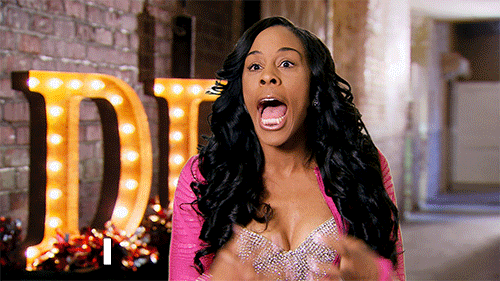 Giphy
GiphyHonestly, putting another Scripture right here could be all that is needed in order to bring this point to a swift and abrupt end. Which one? I Corinthians 13, the Love Chapter, starts off with “Love is patient” (I Corinthians 13:4). Yeah, if you want to know if you love yourself and love yourself well, how patient are you…including with yourself? Throughout the years, I have shared one of my favorite definitions of "patient" in several different articles: “bearing provocation, annoyance, misfortune, delay, hardship, pain, etc., with fortitude and calm and without complaint, anger, or the like.” For me, it’s a blaring reminder that mastering patience isn’t just about waiting (more on that in a sec); it’s about waiting with grace.
Content people can do this because, on some level, they know how to apply the John Piper quote, "God is always doing 10,000 things in your life, and you may be aware of three of them." Another way of looking at this is people who can wait well — without complaining or getting annoyed by delays or challenges in the meantime — get that in order for things to truly come together, there are lots of moving parts…some that they don’t even know about. And so, if they want the best outcome, yes, waiting well is oftentimes not just involved; it is required.
Impatient people don’t get any of this. That’s why they are so stressed out all of the time.
2. You’re Worried About Things You Can’t Control
 Giphy
GiphyThis. Past. Election. Chile. And then the cabinet that that man is putting together as we speak? I don’t even want to get my blood pressure up, expounding on it. Let me just pivot by adding one more Scripture — because it is beyond fitting: “Therefore do not worry about tomorrow, for tomorrow will worry about its own things. Sufficient for the day is its own trouble.” (Matthew 6:34 — NKJV)
Although worrying is something that pretty much everyone does at one point or another, one of my favorite quotes on it is by an American humorist by the name of Erma Bombeck: “Worry is like a rocking chair: it gives you something to do but never gets you anywhere.” And really, when you stop to really think about worrying, isn’t that the truth? For one thing, all worrying does, by definition, is cause you to torment yourself by focusing on things that aren’t even going to happen (somewhere between 85-90 percent of the time, in fact; there is actually a science on that) or trying to control things that are beyond your control.
If being a worry wart is your internal struggle, my advice would be to look at life this way: If you’re worried that you’re about to get written up for getting to work late again, leave your house earlier — you can control that. On the other hand, if you’re worried that you’re going to get laid off before the holiday season ends, so long as you’ve been doing your best (which is also something that you can control), please put your energy elsewhere because that is something that you can’t control.
And I promise that when you choose to be calm and confident over worrying yourself to death, that can help you to manage what you can’t control so much easier. Oh, and your health will thank you, too, because worry is attached to things like insomnia, muscle tension, headaches, overeating, and drinking too much. All this over things that probably won’t happen in the first place? Yeah, sis…(choose to) relax.
And by choosing to chill out, there is some contentment that follows because you will see the good as much as, if not more than, the potential bad. Trust me.
3. The Past and/or Future Consume You
 Giphy
GiphyOn the heels of the Scripture that I just provided for the previous point, it also applies to this one. You know, back when I was doing some intentional research on forgiveness, I always appreciated the insight of author Gary Zukav: “Forgiveness is accepting that the past cannot change.” While this doesn’t mean that you shouldn’t hold people accountable for what they have done, it does help you to be compassionate with those who are truly sorry (check out “Heads Up: It's NOT An Apology If An Amend Isn't Made”) because, no matter what has transpired between you and them, one thing they can’t do is go back into a time machine and change it.
And you know what? When it comes to the mistakes — or, let’s be real, sometimes they are conscious poor decisions — you have made, you can’t either. So, why let their misdeeds or your own consume you to the point of internally destroying you?
Then there’s the future. What if you get robbed? What if your mom gets cancer? What if your husband files for divorce? Girl, if you are caught up in the future that hasn’t even happened yet, you are definitely gonna drive yourself up the wall! And this is why so many mental health experts and platforms are all about encouraging individuals to live in the moment. You can do this by meditating, taking breaks from social media (and the news), journaling, doing things that you enjoy (instead of waiting to put them off), and resting.
Listen, one of the best things about choosing to only focus on the here and now is you can find little things about it to be content with — and that helps you to be/become more content overall.
4. You Always Think About Wanting More
 Giphy
GiphyAlthough it certainly wasn’t my plan for this piece to be so Scripture-heavy, I’ve got to flow with what immediately comes to mind and, for this point, the verse, “So are the ways of everyone who is greedy for gain; It takes away the life of its owners” (Proverbs 1:19 — NKJV) is it. And just what does it mean to be greedy? A greedy individual isn’t just low-key obsessed with getting and having more — please catch it — they are also quite EAGER.
Eager folks also tend to be impatient. Eager folks are perceived by others as being very intense (and not in a good way). More times than not, eager folks haven’t really mastered how to take a moment to appreciate what they do have because all they care about is what’s next. And when you’re in a state of that kind of, well, anxiety…how could it not affect your quality of life? I mean, really.
And what if you read all of that and said, “I’m not greedy; I’m just ambitious” — listen, there is nothing wrong with having goals and wanting to obtain them. However, an ambitious individual knows how to find balance. If they get a promotion, they will schedule a vacation to celebrate it. If they just got a new car, they are not in a rush to get a new house until they can financially afford it. If they were just proposed to with a really nice ring, they aren’t hounding their new fiancé about setting a date within the next two weeks.
People who always want more, without taking the time to enjoy what they already have, are never going to be content. Why? Because there is always something else that you can want…even if you don’t need it or it really isn’t the time for it. Meanwhile, content people get that it’s a good thing to not go after everything all of the time; that it’s far wiser to embrace what is already before them — because some folks don’t even have…that.
5. You Compare Yourself to Others
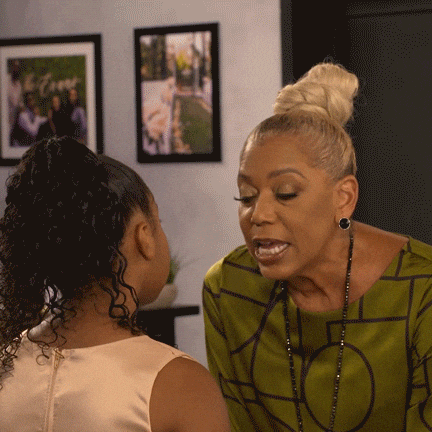 Giphy
GiphySomething that I actually get asked fairly often is, do I feel “some type of way” that I do so much work in the realm of marriage when I’ve never been married myself. The short answer is “absolutely not” because I know that I could’ve been married, a few times over, at this point; however, I am just as intentional about not wanting to be divorced as I am about being in a healthy marriage, not just “a marriage.”
I’m grateful to be in that head and heart space too; otherwise, I would be out here comparing myself to other people — and there is nothing good, healthy, wise, profitable, or beneficial about doing that. In fact, science isn’t a fan of playing the “keeping up with the Joneses” game, either.
According to science, that can ultimately do things like lower your self-esteem, cause you to only see the bad/negative things in your world (in comparison to other people), and it can jack up your perception of what’s really going on with other people. For instance, if you’re 33 and comparing yourself to your friends who are already married and parents, you might want to talk to them about what their day-to-day, beyond their IG posts, is like.
Because while prayerfully, their life is filled with many blessings, if they are being totally honest with you, they will also share that you’ve got some “pros” to your life too (honey, there are some real benefits to being single; check out “If You're Not In Love With Being Single, Ask Yourself These 6 Questions.,” “10 Bona Fide Benefits Of Being Single,” and “10 Words That'll Make You Totally Rethink The Word 'Single'”). Content people get that every season does — because it’s true.
6. You Don’t Verbalize Gratitude Often
 Giphy
GiphyThere is someone in my world who I actually try to avoid as much as possible. It’s not that she’s not smart, and honestly, she’s one of the funniest individuals that I’ve ever known (and I’ve known her for most of my adult life). It’s just that…she is always wanting something, and I find that to make her a very draining individual. Lawd, even as I am typing all of this out, I’m trying to recall a time when I’ve heard her say, “thank you” for something (no joke), let alone express any form of genuine gratitude. She’s just got such a sense of entitlement that whatever she does receive, she thinks she’s owed and what she doesn’t have, she believes that something is wrong if it hasn’t arrived yet. Geeze, what a horrible type of existence.
You don’t have to take my word for it either because there is plenty of data out here to support that people who don’t take the time to be grateful for what they have ended up being unhappy, more stressed out, in more physical pain (yes, literally) and definitely more negative than everyone else — which would explain why people don’t like hanging out with them as much.
So, since this is the time when gratitude is the theme of the season, think about what you are grateful for when it comes to what you’ve accomplished this year, then write it down and post it up somewhere. Then, as far as the individuals, for whom you are grateful for — send them a handwritten note, get them a gift card to their favorite coffee shop, or even just call to tell them.
One of the most beautiful things about being in a state of contentment is it reminds you of a lot of what you already have. It really is enough…for now…in this very moment.
7. Being (and Living) Satisfied Is a Foreign Concept to You
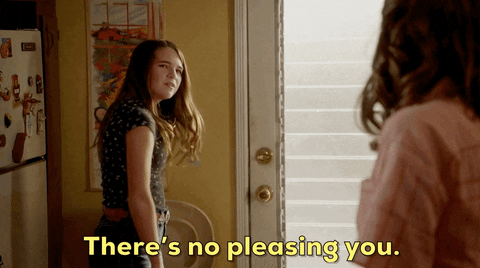 Giphy
Giphy“Tubi movies” really is a complete sentence. LOL. And yes, sometimes, when I’m taking a writing break, I will check out some of the most…I-wouldn’t-normally ones, just to lend my support. In walks Never Satisfied with its own self-explanatory meaning. Y’all, it really is oh so true that there are folks out here dealing with some unpredictable and sometimes even truly dire consequences — and it’s all because they didn’t know how to sit down somewhere and learn how to be satisfied with the people, places, things, and ideas that they already have.
That said, I am indeed a quotes gal, and one of my favorites on the topic of satisfaction is by actor Christopher Reeve: “Success is finding satisfaction in giving a little more than you take,” and although I don’t do what I’m about to do often (because I try to take Matthew 6:1-4 very literally and seriously), I’m going to illustrate what he said about satisfaction by sharing a recent situation.
This past week, a nurse practitioner (I prefer those to doctors) diagnosed me with wrist tendonitis for the first time in my life. If you knew how many keystrokes that I do a day, you’d probably be shocked that it took this long. Anyway, as I was waiting in line to get a prescription, a young Black man was basically freaking out because his insurance was refusing to cover his own meds. According to what he was telling the pharmacist, he always only pays $5; however, this time, they were charging $62, he simply didn’t have it, and the insurance company was not picking up.
As I watched him shaking and sweating while saying that he really needed it today and fretting while talking to his mom on the phone, I offered to cover it — and after going back and forth with him for about three minutes, I did. In my mind, although I didn’t plan on spending about $85 (total) that day, the little inconvenience that it was costing me was nothing in comparison to how much it was going to benefit him — I could tell from how he and his mother reacted (even the pharmacist mouthed “thank you so much”), and that is what made it money well spent.
To help someone who had no way of helping themselves in the moment? That brought me a lot of satisfaction because it’s nice to lighten someone’s load while leaving it to karma to handle it. ALL OF IT.
And that’s why I thought it was best to wrap all of this up with a reminder that being satisfied is being content. And when you can be so satisfied with your life that you want to help others? That is a level of contentment that is truly unmatched because you start looking for ways to bless others simply so that they can feel just as content as you do.
____
Our culture? It really is never satisfied, which explains why a lot of people are so miserable. SMDH. You don’t have to be like the masses, though. This Thanksgiving, please purpose in your mind (and heart) to be(come) more content. It will make you a rare gem that benefits everyone and everything around you.
Including yourself, sis. No doubt about it.
Let’s make things inbox official! Sign up for the xoNecole newsletter for love, wellness, career, and exclusive content delivered straight to your inbox.
Featured image by Shutterstock
Originally published on November 28, 2024



